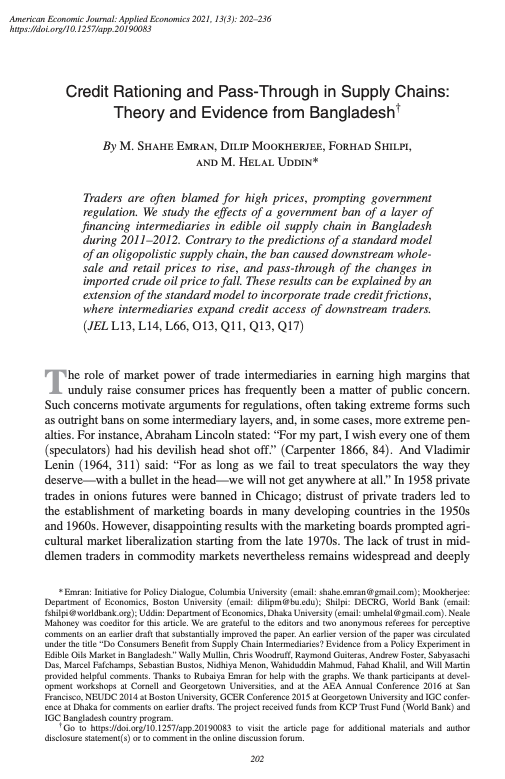Reproducibility package for Credit Rationing and Pass-Through in Supply Chains: Theory and Evidence from Bangladesh
Overview
Traders are often blamed for high prices, prompting government regulation. We study the effects of a government ban of a layer of financing intermediaries in edible oil supply chain in Bangladesh during 2011–2012. Contrary to the predictions of a standard model of an oligopolistic supply chain, the ban caused downstream wholesale and retail prices to rise, and pass-through of the changes in imported crude oil price to fall. These results can be explained by an extension of the standard model to incorporate trade credit frictions, where intermediaries expand credit access of downstream traders.
Reproducibility Package
| Name | URL |
|---|---|
| Creative Commons Attribution 4.0 International (CC BY 4.0) License | https://creativecommons.org/licenses/by/4.0/ |
| Repository name | URI |
|---|---|
| AEA Data and Code Repository | https://www.openicpsr.org/openicpsr/aea |
Reproducibility
A readme file with detailed instructions is part of the (external) reproducibility package.
Data
All data is public and contained in the (external) reproducibility package. For access to the raw data (apart from reproducibility) see the readme file in the package.
Description
| Author | Affiliation | |
|---|---|---|
| M. Shahe Emran | Initiative for Policy Dialogue, Columbia University | shahe.emran@gmail.com |
| Dilip Mookherjee | Department of Economics, Boston University | dilipm@bu.edu |
| Forhad Shilpi | World Bank | fshilpi@worldbank.org |
| M. Helal Uddin | Department of Economics, Dhaka University | umhelal@gmail.com |
We are grateful to the editors and two anonymous referees for perceptive comments on an earlier draft that substantially improved the paper. An earlier version of the paper was circulated under the title “Do Consumers Benefit from Supply Chain Intermediaries? Evidence from a Policy Experiment in Edible Oils Market in Bangladesh.” Wally Mullin, Chris Woodruff, Raymond Guiteras, Andrew Foster, Sabyasachi Das, Marcel Fafchamps, Sebastian Bustos, Nidhiya Menon, Wahiduddin Mahmud, Fahad Khalil, and Will Martin provided helpful comments. Thanks to Rubaiya Emran for help with the graphs. We thank participants at development workshops at Cornell and Georgetown Universities, and at the AEA Annual Conference 2016 at San Francisco, NEUDC 2014 at Boston University, GCER Conference 2015 at Georgetown University and IGC conference at Dhaka for comments on earlier drafts.
2021-07
Scope and coverage
| Location | Code |
|---|---|
| Bangladesh | BGD |
Disclaimer
The materials in the reproducibility packages are distributed as they were prepared by the staff of the International Bank for Reconstruction and Development/the World Bank. The findings, interpretations, and conclusions expressed in this event do not necessarily reflect the views of the World Bank, the Executive Directors of the World Bank, or the governments they represent. The World Bank does not guarantee the accuracy of the materials included in the reproducibility package.
Access and rights
| Name | URI |
|---|---|
| Creative Commons Attribution 4.0 International (CC BY 4.0) License | https://creativecommons.org/licenses/by/4.0/ |
Information on metadata
| Name | Abbreviation | Affiliation |
|---|---|---|
| Krestel | CK | World Bank |
2023-06-27
1
